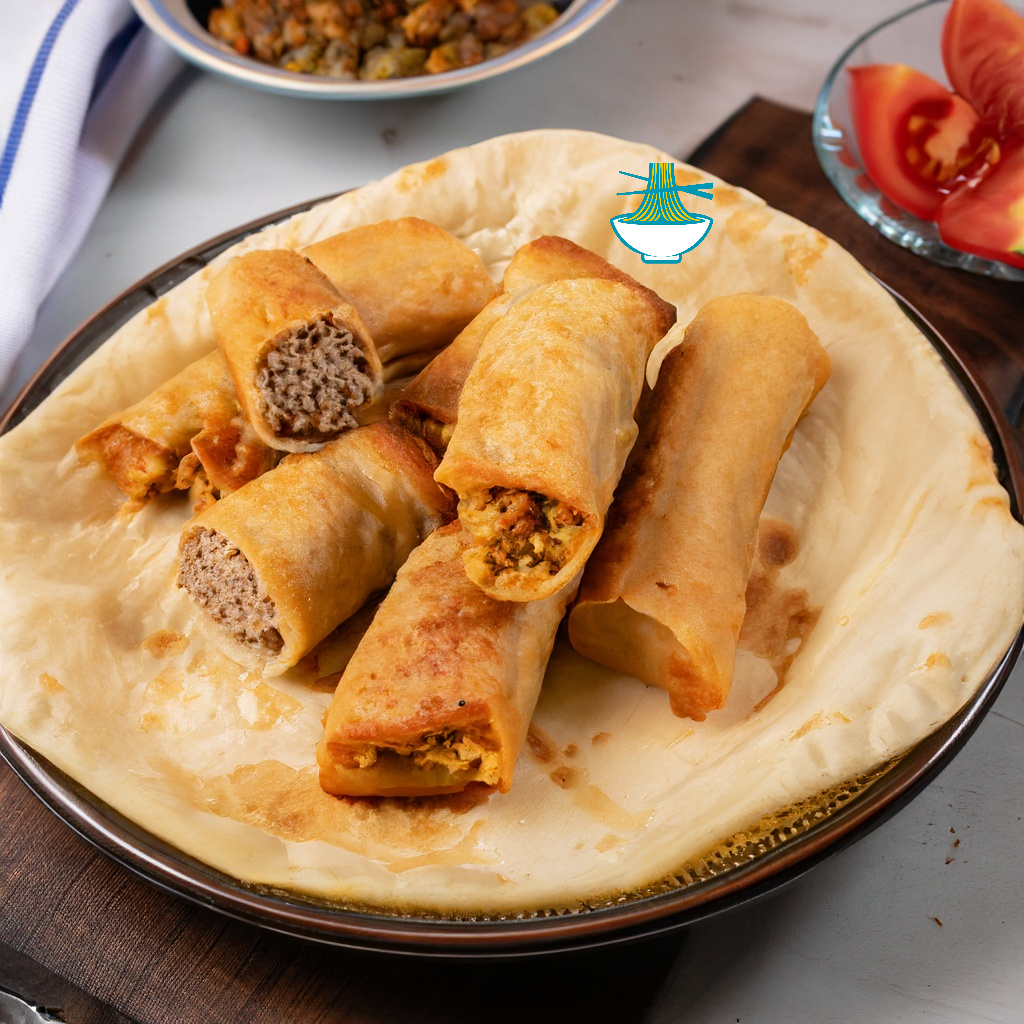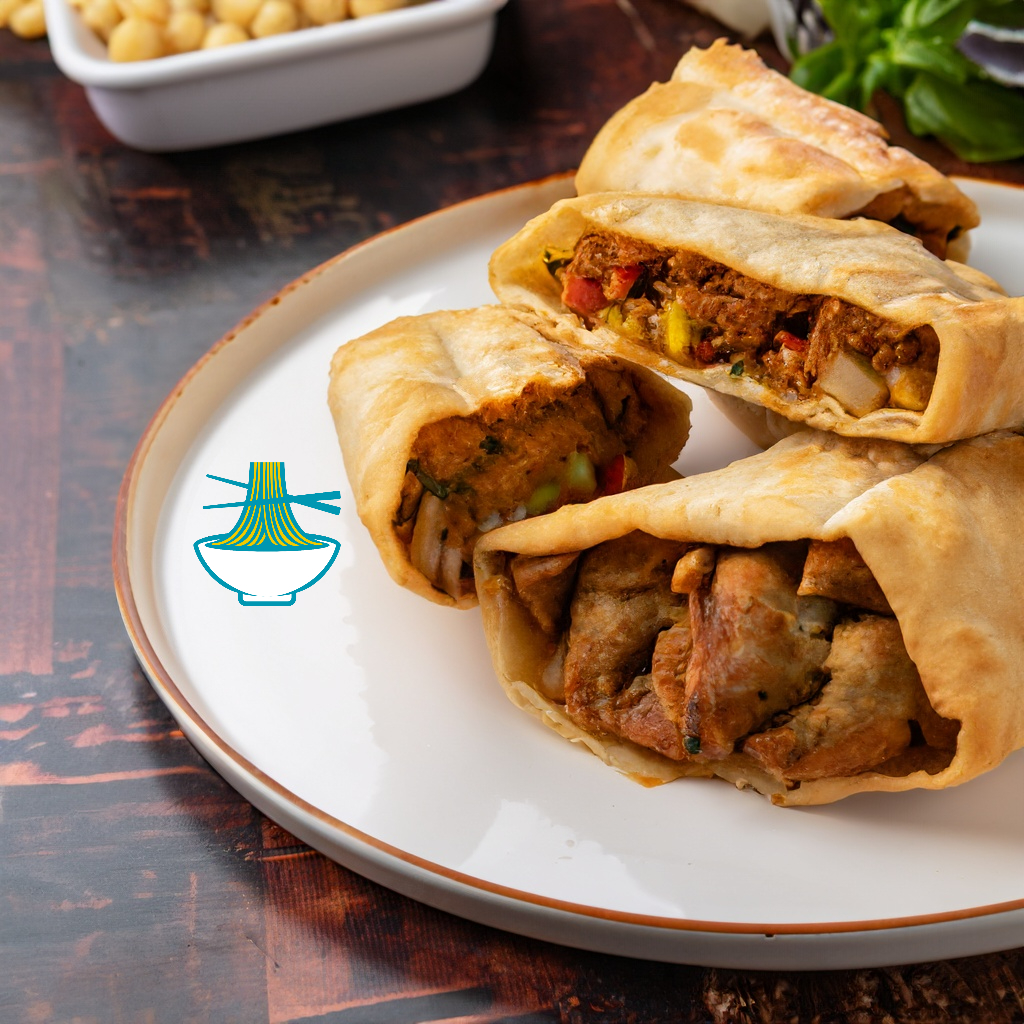Bourek, also known as Börek, is a savory pastry with origins in the Ottoman Empire, now a beloved dish across the Mediterranean and Middle East. Crafted with delicate phyllo dough, its fillings range from cheese and spinach to seasoned meats or vegetables, making it both versatile and satisfying. Each region, from Turkey to Algeria and Tunisia, has adapted Bourek to reflect local flavors and traditions. This dish is not only celebrated for its crispy, golden texture but also for its rich nutritional profile, providing carbohydrates for energy, proteins from its fillings, and vitamins such as A and C when vegetables are included. However, its fried versions can be calorie-dense, making moderation key to enjoying this delightful diet treat.

Ingredients:
- 1 package of phyllo dough (about 20 sheets)
- 1 cup of feta cheese, crumbled
- 1 cup of fresh spinach, chopped
- 1 egg, beaten
- 1/2 cup olive oil (for brushing the phyllo)
- Salt and pepper to taste
Healthier Alternatives
To enjoy bourek in a more nutritious way:
- Baking Instead of Frying: Baking reduces the fat content significantly compared to frying.
- Low-Calorie Fillings: Use vegetables like spinach, mushrooms, or roasted peppers as primary fillings.
- Whole Wheat Dough: Replace traditional phyllo with whole wheat alternatives for added fiber.
- Reduced Cheese: Opt for lower-fat cheese or reduce the quantity used in the filling.
- Use Olive Oil Sparingly: Instead of brushing phyllo dough heavily with olive oil, use a light spray or brush.
Instructions:
1. Preheat the oven to 350°F (175°C) and line a baking sheet with parchment paper.
2. In a bowl, combine feta cheese, spinach, and the beaten egg. Season with salt and pepper to taste. Set aside.
3. Unroll the phyllo dough, cutting it into rectangles (about 8 x 4 inches).
4. Brush one rectangle with olive oil, then place another sheet on top. Continue layering and brushing the dough, stacking 3 sheets at a time.
5. Spoon 1-2 tablespoons of the feta-spinach mixture onto the bottom of each rectangle, leaving a small border.
6. Fold the bottom edge over the filling, tuck in the sides, and roll the dough into a cylinder. Brush the top with more olive oil.
7. Repeat the process for the remaining phyllo and filling, then arrange the bourek on the prepared baking sheet.
8. Bake for 20-25 minutes, or until the bourek is golden brown and crispy.
9. Allow to cool for a few minutes before serving.
Note:
Bourek can be served as an appetizer, side dish, or even a main course, often accompanied by tzatziki, hummus, or a fresh salad. Variations include fillings with ground meat, lamb, or potatoes for different flavors.
Tips
- Handling Phyllo Dough: Keep phyllo sheets covered with a damp cloth while working to prevent drying.
- Best Oils for Frying: Use oils with high smoke points, like sunflower or canola oil, for frying.
- Portion Control: Cut bourek into smaller pieces to make it easier to serve and enjoy in moderation.
- Experiment with Spices: Enhance fillings with spices like paprika, cumin, or sumac for a more flavorful dish.
Versatility of Bourek
- Bourek is a versatile dish that can be served in various ways:
- As a Snack: Bite-sized pieces work well as finger food or snacks.
- Side Dish: Serve alongside soups, stews, or salads to complement the meal.
- Main Course: Larger rolls or layers with hearty fillings like meat or potatoes can make it a filling main dish.
Frequently Asked Questions
1. What is the difference between bourek and other pastries like manakeesh?
- Bourek uses phyllo dough, which is extremely thin and flaky, while manakeesh and similar pastries typically use thicker doughs like flatbread or leavened doughs.
2. Can bourek be prepared in advance and stored?
- Yes, bourek can be prepared and frozen before baking or frying. When needed, it can be baked straight from the freezer, making it convenient for occasions.
3. What are the best vegetarian fillings for bourek?
- Popular vegetarian options include spinach with cheese, mashed potatoes with herbs, or sautéed vegetables like zucchini, carrots, and onions.
4. How can bourek be presented for special occasions?
- Arrange bourek pieces on a decorative platter and serve with dips like tzatziki, hummus, or tahini sauce. Garnish with fresh herbs or lemon wedges for an elegant touch.
5. Can alternative doughs be used instead of phyllo?
- Yes, puff pastry or homemade thin doughs can be used, though the texture may differ slightly. Puff pastry offers a richer, flakier result, while homemade dough gives a more rustic touch.

Nutrition Value:
Bourek is a delicious and energy-dense dish. It provides carbohydrates from phyllo dough, protein from its fillings (like cheese, meat, or eggs), and essential vitamins and minerals depending on the ingredients. For example, spinach adds vitamins A and K, while feta cheese offers calcium and probiotics. However, fried versions of bourek can be high in fats and calories, with a single serving providing up to 300-400 calories. Consuming it in moderation and opting for healthier preparation methods can help balance its nutritional benefits with potential drawbacks.
1. phyllo dough (1 package, about 20 sheets)
- calories: approximately 800-1000 (depending on the brand)
- carbohydrates: around 160-200 grams
- protein: about 20 grams
- fat: approximately 10-15 grams
- sodium: varies by brand (often 400-800 mg)
- cholesterol: 0 mg
- vitamins: contains some B vitamins (thiamin, riboflavin)
- minerals: small amounts of iron and magnesium
- nutritional benefit: phyllo dough is low in fat and provides a crispy texture, serving as a versatile base for various fillings.
2. feta cheese (1 cup, crumbled)
- calories: around 396 calories
- carbohydrates: approximately 8 grams
- protein: about 21 grams
- fat: approximately 32 grams
- sodium: around 1100 mg
- cholesterol: 55 mg
- vitamins: contains vitamins A, B12, and riboflavin
- minerals: rich in calcium and phosphorus
- nutritional benefit: feta cheese adds a tangy flavor, is a good source of protein and calcium, and may support gut health due to beneficial probiotics.
3. fresh spinach (1 cup, chopped)
- calories: around 7 calories
- carbohydrates: approximately 1 gram
- protein: about 1 gram
- fat: approximately 0 grams
- sodium: around 24 mg
- cholesterol: 0 mg
- vitamins: high in vitamins A, C, K, and folate
- minerals: contains iron, calcium, and magnesium
- nutritional benefit: spinach is nutrient-dense, providing essential vitamins and minerals, along with antioxidants that support overall health.
4. egg (1 whole, beaten)
- calories: around 72 calories
- carbohydrates: approximately 0.6 grams
- protein: about 6 grams
- fat: approximately 5 grams
- sodium: around 70 mg
- cholesterol: 186 mg
- vitamins: contains vitamins A, D, E, B12, and riboflavin
- minerals: good source of selenium and phosphorus
- nutritional benefit: eggs are a high-quality protein source, beneficial for muscle maintenance, and contain nutrients important for eye health.
5. olive oil (1/2 cup, for brushing the phyllo)
- calories: around 955 calories
- carbohydrates: 0 grams
- protein: 0 grams
- fat: approximately 109 grams
- sodium: around 0 mg
- cholesterol: 0 mg
- vitamins: contains vitamin E and K
- minerals: small amounts of calcium and iron
- nutritional benefit: olive oil is rich in monounsaturated fats and antioxidants, promoting heart health and reducing inflammation.
6. salt and pepper (to taste)
- calories: negligible
- carbohydrates: negligible
- protein: negligible
- fat: negligible
- sodium: varies based on the amount used
- cholesterol: 0 mg
- vitamins: negligible
- minerals: sodium from salt
- nutritional benefit: salt enhances flavor, while pepper adds a mild spiciness; both are used in moderation to season dishes without adding significant calories or nutrients.


Comments